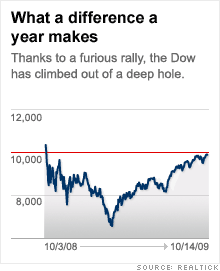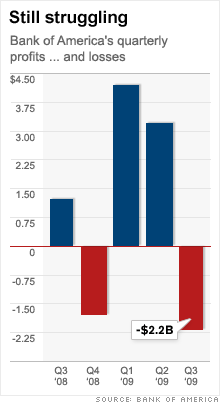Dow can't hold 10,000
Investors disappointed by the most recent quarterly financial reports send stocks lower Friday, but the week ends up a winner.


NEW YORK (CNNMoney.com) -- Stocks slumped Friday, at the end of an upbeat week on Wall Street, as a sour response to General Electric and Bank of America's quarterly results gave investors a reason to retreat.
The Dow Jones industrial average (INDU) fell 67 points, or 0.7%. After closing above 10,000 for two straight sessions, the Dow ended just below that psychological benchmark.
The S&P 500 (SPX) index shed 9 points, or 0.8%, and the Nasdaq composite (COMP) dropped 16 points, or 0.8%.
Stocks slipped back after ending Thursday's session at a more than one-year high, with corporate results the big factor.
"Some companies aren't seeing that improvement in revenue everyone's looking for, and in the financial sector, credit losses remain a significant problem," said Robert McGee, portfolio manager at CS McKee.
The stock market has essentially been on a tear since bottoming in March, with repeated calls for a big 10% to 15% selloff going unmet. Since hitting a more than 12-year low on March 9, the S&P 500 has gained 60.8% as of Friday's close.
While the major indexes ended Friday with weekly gains, the pace of the advance in general has slowed of late. Month-to-date, the S&P 500 has gained just 2.9% as of Friday's close.
"The market has had a very strong run off the March lows," said Michael Sheldon, chief market strategist at RDM Financial Group. "But now investors are looking to see if we can get a push higher after the third-quarter results are in, similar to what we saw after first and second-quarter earnings."
The results this week have been mixed, with earnings largely beating estimates and revenue mostly in line. Goldman Sachs, Intel and Google were among the companies to impress, while Citigroup, GE and Bank of America were among the companies that disappointed.
Next week brings a slew of big-name corporate results, including Apple, Coca-Cola, Wells Fargo, Morgan Stanley, American Express and Microsoft.
"Liquidity levels are helping to drive the market higher" said Sheldon. "But I think we'll need to see some better economic news, in terms of employment, along with greater visibility from companies heading into 2010 to help propel stocks even higher."
Bank of America: Bank of America (BAC, Fortune 500) reported a $2.2 billion third-quarter loss as consumer credit problems overshadowed strength in its wealth management business.
The Dow component reported a loss of 26 cents per share versus a profit of 15 cents per share a year ago. Analysts surveyed by Briefing.com expected BofA to report a loss of 21 cents per share.
Consumer credit losses are cutting into its attempts to return to profitability and pay back $45 billion to the government, BofA said. The company has received that money in the aftermath of its purchases of Merrill Lynch and Countrywide in the thick of the financial crisis.
However, like JPMorgan Chase (JPM, Fortune 500) earlier this week, BofA said that while loan losses and money set aside for loan losses continue to grow, the pace of the growth is slowing.
Separately, late Thursday, the company said outgoing CEO Ken Lewis will not take a salary for 2009, at the request of Treasury's pay czar, Kenneth Feinberg. Lewis has agreed to return the roughly $1 million he has already earned in his last year at the company. The CEO is still on track to receive $69 million in pension benefits, other stock awards and deferred compensation.
BofA shares fell 4.6% Friday.
A variety of bank stocks fell Friday, sending the KBW Bank (BKX) index down by 3.2%.
Financial results: General Electric (GE, Fortune 500) reported weaker quarterly earnings that topped estimates on lower revenue that missed estimates.
The conglomerate and Dow component was hurt by GE Capital, its troubled finance arm, but benefited from cost-cutting and strength in select units. The company said it sees signs of stabilization along with the economy. GE shares fell almost 5%.
Google (GOOG, Fortune 500) reported higher quarterly sales and earnings that topped estimates in a report released late Thursday. In a statement, Google CEO Eric Schmidt said "we believe the worst of the recession is behind us, and we now feel comfortable investing heavily in our future."
Google shares rose 3.8% Friday.
Also after the close Thursday, Dow component IBM (IBM, Fortune 500) reported higher quarterly earnings that topped estimates and lower revenue that beat forecasts. Looking forward, the company said it expects full-year 2009 earnings of at least $9.85 per share versus its previous forecast of $9.70 per share.
But investors focused on the lower revenue Friday and shares fell 5%.
World markets: Global markets were mixed. In Europe, London's FTSE 100 fell 0.6%, France's CAC 40 slid 1.5% and Germany's DAX lost 1.5%. Asian markets ended mixed, with the Hong Kong Hang Seng lower and the Japanese Nikkei lower.
Bonds: Treasury prices rallied, lowering the yield on the 10-year note to 3.41% from 3.46% late Thursday. Treasury prices and yields move in opposite directions.
Currency and commodities: The dollar gained versus the euro and the yen, turning positive after its recent across-the-board weakness versus a basket of currencies.
U.S. light crude oil for November delivery rose 95 cents to $78.53 a barrel on the New York Mercantile Exchange, after ending the previous session at the highest level in a year.
COMEX gold for December delivery rose 90 cents to $1,051.50 an ounce. Gold hit record highs repeatedly over the last week in response to a weak U.S. dollar and ongoing concerns about inflationary pressures.
Market breadth was negative. On the New York Stock Exchange, losers beat winners nearly two to one on volume of 1.38 billion shares. On the Nasdaq, decliners topped advancers by more than two to one on volume of 2.22 billion shares. ![]()
No pay for Bank of America CEO
Google: Worst is behind us
Golden quarter for Goldman Sachs
FDIC bank fund in the red until 2012
Don't trust Dow 10,000
Economists: slow, painful recovery ahead
Fighting off the Bear: Seven stories
50 Most Powerful Women
Bernanke: Fed's unlikely risk taker
100 Fastest-growing companies
50 years of profit swings

